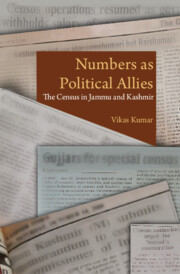Preface
Published online by Cambridge University Press: 25 October 2023
Summary
In the first two decades after independence, the union government's role as the facilitator of interstate redistribution was closely linked to decennial population censuses. The allocation of seats in the parliament and federal funds tracked the most recent census data. In the mid-1970s, the growing concern over a rapidly increasing population amidst food and other scarcities forced a hasty uncoupling of the census and key federal policies to make room for more aggressive population control measures. This was, perhaps, necessary to protect the interests of states that had already achieved relatively lower levels of fertility. In the following decades, the census could not be conducted in Assam (1981) and Jammu and Kashmir (J&K) (1991) due to political disturbances. (In 1994, substantive changes were introduced in the Census Act, 1948, to expand the scope of punitive measures, among other things.) The year 2001 was therefore very important for the Census of India because the government was trying to enumerate the whole country once again after a gap of three decades, and there was an expectation that interstate redistribution of resources and power could be recoupled with the headcount. There was also a hype around the first census of the new millennium.
While the census managed to cover the entire country in 2001, it was marred by the politicisation of the headcount. The government had to postpone interstate delimitation to until after the first census taken after 2026. Six states – Arunachal Pradesh, Assam, J&K, Jharkhand, Manipur and Nagaland – could not even use the latest data for intrastate delimitation. In some of these states, the civil society and political parties alleged that the process of enumeration was subverted by vested interests and moved courts to challenge delimitation based on a flawed census. At least five others – Chhattisgarh, Meghalaya, Sikkim, Tripura and Uttarakhand – conducted intrastate delimitation under (political) constraints.
Soon after the 2001 census, Radhabinod Koijam, a former chief minister of Manipur, flagged the politically contentious nature of cartographic and demograhic statistics in his neighbourhood. In 2005, in an interview with Sanjoy Hazarika, chief minister Neiphiu Rio admitted that Nagaland's headcount was highly inflated due to political competition among tribes. As a student of engineering and later economics, I found it intriguing that a ‘simple’ measure such as headcount could be so deeply contested.
- Type
- Chapter
- Information
- Numbers as Political AlliesThe Census in Jammu and Kashmir, pp. xvii - xxPublisher: Cambridge University PressPrint publication year: 2024



